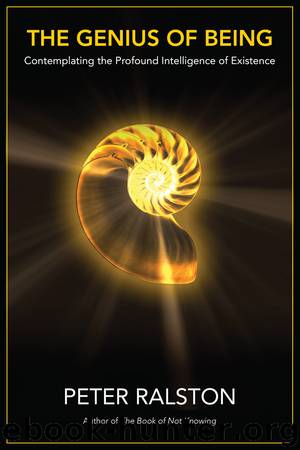The Genius of Being by Peter Ralston

Author:Peter Ralston
Language: eng
Format: epub, mobi
ISBN: 9781623171131
Publisher: North Atlantic Books
Published: 2016-12-01T05:00:00+00:00
Primal Emotions
6:11 In our culture we tend to think of gut-level feelings and outbursts of basic emotion as instinctual, but this isn’t really true. What role does instinct play in these impulses? We can imagine that some fundamental instinctual programs are the source of primary reactions such as fear, anger, attraction, and so on. What’s overlooked, however, is that the nature of instinctual pressure is quite different from the end product that we experience.
6:12 Our experience of any of these impulses is so dominated by conceptually produced personal, social, and cultural contributions that the actual biological source is virtually unrecognizable. As mentioned, when some object comes flying at our head, we might imagine a flinching reaction is instinctual, but it’s not. The fact that such a seemingly automatic and “primal” reaction has to be learned really puts a dent in our notions regarding instinct.
6:13 If this is true for something so basic as reacting to impending physical impact, we can surmise that most of what we experience in the emotional realm is also learned. The origin of fear may be rooted in physiology, but exactly what we fear must be learned. A combination of conceptual activities—which can in fact be overridden—is what produces the experience that we call fear. When a protozoan moves away from a needle poke, we’re not seeing fear but action in response to a stimulus. This basic instinctual relationship may be the foundation of our emotions, but the many sophisticated conceptual activities that are added to this drive bury the role that instinct plays. This makes it difficult to tell the difference between instinct and what is learned and applied to our emotions. The majority of what we experience as emotion is not instinctual but conceptually produced.
6:14 Regardless of the role it may play in stimulating an emotion, instinct itself is no more emotional for humans than for protozoa. The impulse to react in negative or positive ways may be built-in and obviously we have a capacity to express, even if unwittingly, displeasure or pleasure, but the vast majority of our experience of emotions is something we’ve crafted, largely to serve our social selves. What’s more, instinct itself doesn’t have to dominate our experience. It is possible to transcend these impulses, which suggests that we ourselves may not be inescapably fused with the biological.
Download
This site does not store any files on its server. We only index and link to content provided by other sites. Please contact the content providers to delete copyright contents if any and email us, we'll remove relevant links or contents immediately.
The Way of Zen by Alan W. Watts(6614)
Ego Is the Enemy by Ryan Holiday(5450)
The Art of Happiness by The Dalai Lama(4130)
The Book of Joy by Dalai Lama(3986)
Why Buddhism is True by Robert Wright(3454)
Spark Joy by Marie Kondo(3304)
Shift into Freedom by Loch Kelly(3199)
Happiness by Matthieu Ricard(3050)
A Monk's Guide to a Clean House and Mind by Shoukei Matsumoto(2915)
The Lost Art of Good Conversation by Sakyong Mipham(2654)
The Meaning of the Library by unknow(2573)
The Unfettered Mind: Writings from a Zen Master to a Master Swordsman by Takuan Soho(2311)
The Third Eye by T. Lobsang Rampa(2269)
Anthology by T J(2215)
Red Shambhala by Andrei Znamenski(2200)
The Diamond Cutter by Geshe Michael Roach(2062)
Thoughts Without A Thinker: Psychotherapy from a Buddhist Perspective by Epstein Mark(2028)
Twilight of Idols and Anti-Christ by Friedrich Nietzsche(1894)
Advice Not Given by Mark Epstein(1881)
